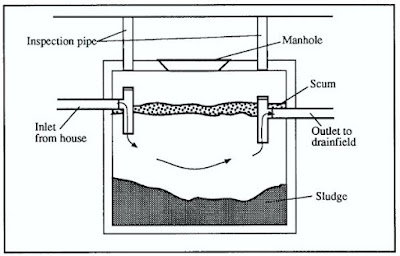Septic Tank
Sewage or untreated household waste will quickly clog all but the most porous gravel formations. The septic tank conditions sewage to allow percolation of the liquid portion into the subsoil. The most important function of septic tanks is to protect the absorption ability of the subsoil. In doing this, the septic tank does the following three things.
Removes solids from liquid
Provides biological treatment
Stores scum and sludge
 |
| Cross-section of Septic Tank |
Advantages
1. Septic tanks can be easily constructed and do not require anyskilled supervision during construction. More ever, there is no
maintenance problem (except periodical cleaning) as there is no
moving part in it.
2. Their cost is reasonable compared to the advantages and
sanitation they offer on rural or urban areas, where no sewage
system has been load.
3. An excellently functioning septic tank can considerably reduce
the suspended solids and BOD from sewage.
4. The sludge volume to be disposed of is quite less, as compared
to that in a normal Iedomentation tank. The quantity is reduced
due to digestion taking place in the tank itself. The reduction in
volume is about 60% and reduction in weight is about 30%
5. The effluent from the septic tank can be disposed of an land in a
soak-pit or a cost pool, without mach trouble.
6. They are best suited for irolated rural, areas, and for isolated
hospitals, buildings etc.
Disadvantages
1. If the tank is not properly functioning, which happens many istimes then the effluents will be very foul, dark and even worser
than the influent.
2. They require too large sizes for serving many people.
3. Leakage of gases from the top cover of septic tank may cause
bad smells and environmental pollution.
4. Periodical cleaning, removal and disposal of sludge remains a
tedious problem.
5. The working of a septic tank is centre dictable and non-uniform.

![[PDF] Download IS 800 Code | Indian Standard Code for Steel](https://blogger.googleusercontent.com/img/b/R29vZ2xl/AVvXsEjMmVdQd3q6sKYLbOG23DVJg2U_8IrdWJSfCcyA7gKs5NKVFBsi6dFPhGxoVctqzOHEIvJ6pqvQ6mpFMd5vV0U5IQHo-FETwRXTjbZ-Dok9CHxUJgePxHyFTHa2pNiWyW4mkYCJWOv_2IcP/w100/is-800-2007.JPG)




![[PDF] SP 16 :1980 Design Aids For Reinforced Concrete to IS : 456-1978](https://blogger.googleusercontent.com/img/b/R29vZ2xl/AVvXsEj3vWyWR9sVpY2Mcip5F3ttq_4jje6Et0mqiBug-q8n7kClvXle3KD0XtZBwYBtmYFfIekvQYIW9gFB5aqcri6KrHD4x2PalOyEWAXPkLNFfbXe8m9m8WvCLSEWok7vPivvYidB1tj8JjeX/w100/is-sp-16-1980.JPG)
![[PDF] IS 456 2000 | Download Civil Engineering Code](https://blogger.googleusercontent.com/img/b/R29vZ2xl/AVvXsEjl8mzhZI_smGwhJPipCx2TuxHldgAvnHrYfkud8mDJ1kF4Syd83-TNKsXjyY1BVxFrxZ1tt-fErpupgiF146wqOfPtGo8M9GWrnQX9b9TyA-YtjlNWnlwdk9LaMN_JJN8AGCU619UI6Uu_/w100/is-456-2000.JPG)

0 Comments